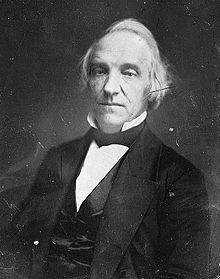Daniel S. Dickinson
| Daniel S. Dickinson | |
|---|---|
 |
|
| 27th Attorney General of New York | |
|
In office January 1, 1862 – December 31, 1863 |
|
| Governor |
Edwin D. Morgan Horatio Seymour |
| Preceded by | Charles G. Myers |
| Succeeded by | John Cochrane |
|
United States Senator from New York |
|
|
In office November 30, 1844 – March 3, 1851 |
|
| Preceded by | Nathaniel P. Tallmadge |
| Succeeded by | Hamilton Fish |
| 14th Lieutenant Governor of New York | |
|
In office January 1, 1843 – December 31, 1844 |
|
| Governor | William C. Bouck |
| Preceded by | Luther Bradish |
| Succeeded by | Addison Gardiner |
| Personal details | |
| Born |
Daniel Stevens Dickinson September 11, 1800 Goshen, Connecticut |
| Died | April 12, 1866 (aged 65) New York City, New York |
| Political party | Democratic |
| Spouse(s) | Lydia Knapp Dickinson |
Daniel Stevens Dickinson (September 11, 1800 – April 12, 1866) was a New York politician, most notable as a United States Senator from 1844 to 1851.
Born in Goshen, Connecticut, he moved with his parents to Guilford, Chenango County, New York, in 1806. He attended the common schools, was apprenticed to a clothier, and taught school at Wheatland, New York from 1821 on. In 1822, he married Lydia Knapp. He also engaged in land surveying, studied law, and was admitted to the bar in 1828. He commenced practice in Guilford, and served as Postmaster of Guilford from 1827 to 1832. He moved to Binghamton, New York and served as its first Village President in 1834.
He was a member of the New York State Senate (6th D.) from 1837 to 1840, sitting in the 60th, 61st, 62nd and 63rd New York State Legislatures. He was Lieutenant Governor of New York from 1843 to 1844. In 1844, he was a presidential elector, voting for James K. Polk and George M. Dallas.
In 1844 he was appointed as a Democrat to the U.S. Senate to fill the vacancy caused by the resignation of Nathaniel P. Tallmadge, and was subsequently elected to a full term, holding office from November 30, 1844, to March 3, 1851. He was Chairman of the United States Senate Committee on Finance (1849–1850), a member of the Committee on Manufactures (Twenty-ninth and Thirtieth United States Congresses), and a member of the Committee on Private Land Claims (Thirty-first United States Congress). As a senator and after, Dickinson was the leader of the conservative Hunker faction of the New York Democratic Party, and would eventually become leader of the "Hards" who opposed reconciliation with the more radical Barnburner faction which had left the party in 1848 to join the Free Soilers. Dickinson resumed the practice of law in 1851. He was delegate to the 1852 Democratic National Convention. In 1853, President Franklin Pierce appointed him as Collector of the Port of New York, but he declined to take office. In 1860, he supported John C. Breckinridge for President.
...
Wikipedia
